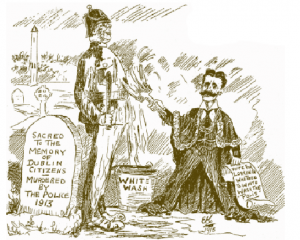
Michael Judge, a member of the Ancient Order of Hibernians, was bitterly opposed to the admission of Redmond’s nominees to the provisional committee, saying later that ‘had they been men, they could have snapped their fingers at John Redmond and all his influence’. Judge was the only one of the ‘Home Rule’ members to remain on the Irish Volunteer committee after the split. On the other hand, one of the ‘physical force’ element on the committee opted to switch to the National Volunteers. Robert Page, who began 1914 as an IRB member, ended it as a recruiting sergeant for the British Army. Page was a member of C Company, 4th Battalion, who drilled at Larkfield. At a meeting of the company after the split, he was one of only four people out of 120 who opted to go over to Redmond. His company commander told the four that the only honourable thing for them to do was to join the British Army. He ‘had a job to prevent them killing Page that night’. Some months later, he saw that his advice had been taken when he saw a recruiting advertisement saying, ‘Apply to Sergeant R. Page’.
